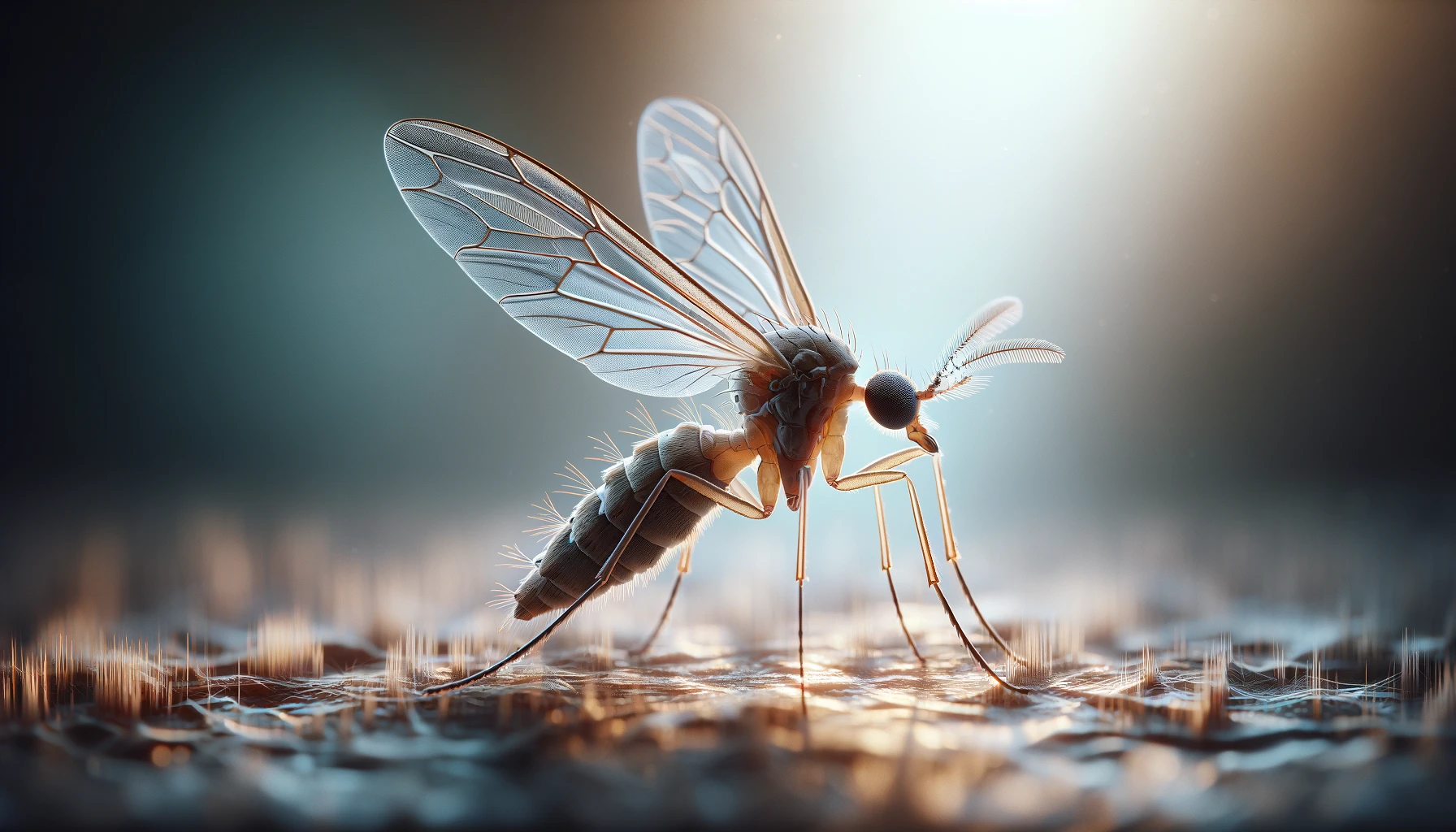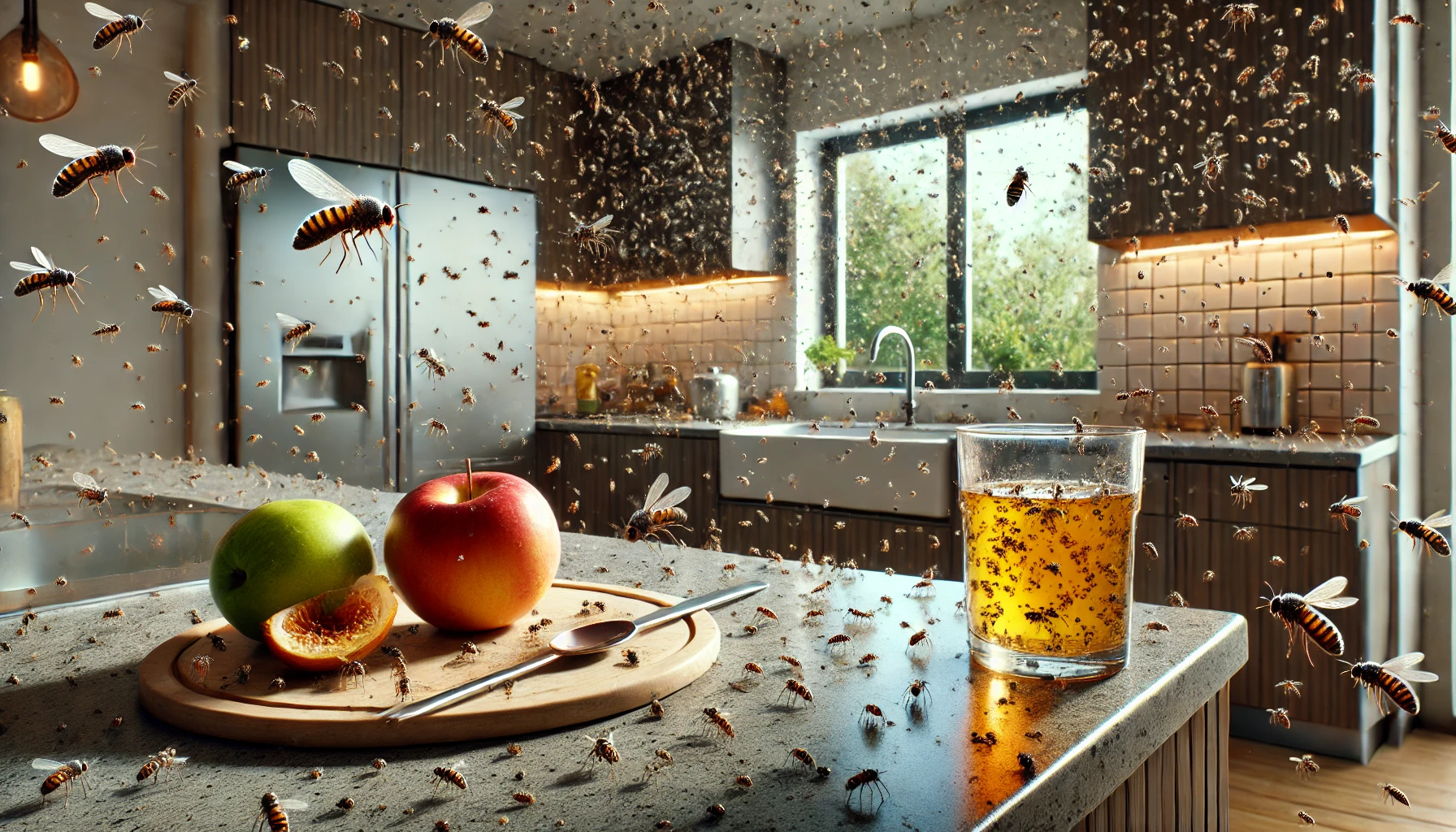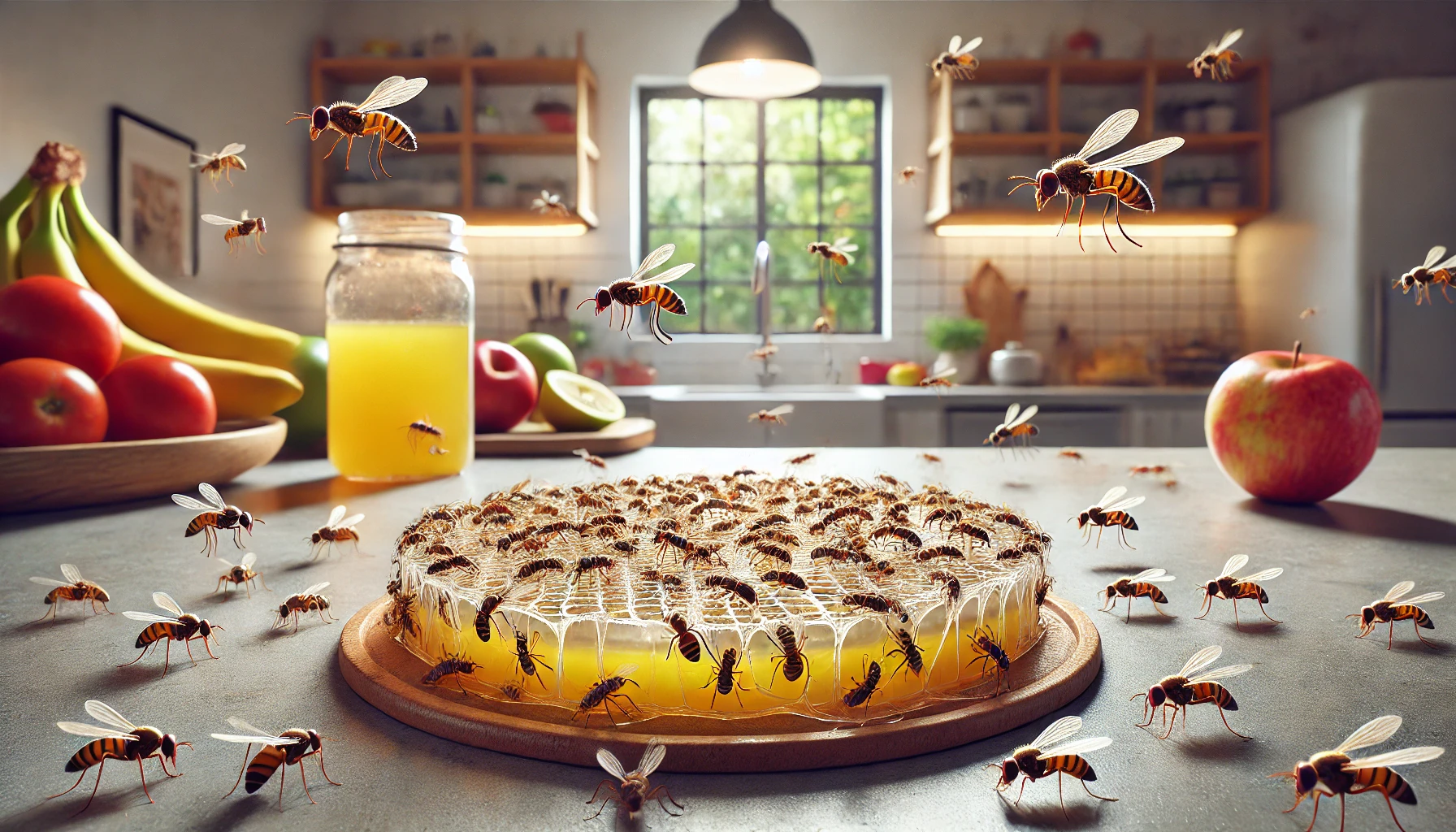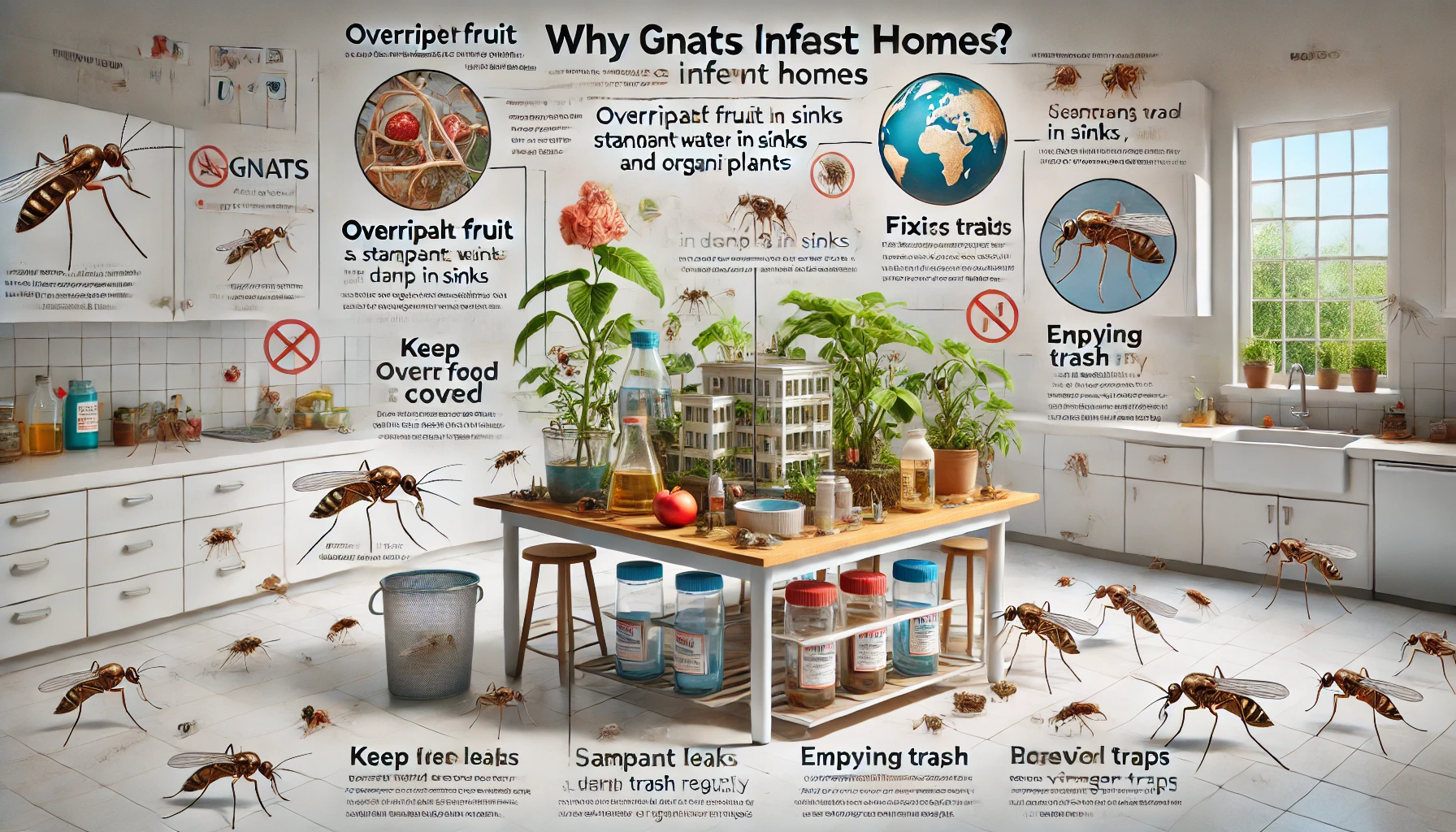Key Takeaways
- Gnats are attracted to moisture, decaying food, and organic matter; controlling these factors is crucial.
- Maintain cleanliness by disposing of food waste promptly and regularly cleaning kitchens and drains.
- Control indoor moisture with proper ventilation, dehumidifiers, and fixing leaks.
- Avoid overwatering houseplants and use preventive treatments to deter gnats.
- Seal entry points with screens, caulking, and weather stripping to keep gnats out.
- Use natural remedies like vinegar and sticky traps to manage small infestations early.
- Keep your yard clean, manage standing water, and maintain outdoor areas to reduce breeding sites.
- Seek professional pest control services for severe or persistent infestations.
 Gnats are tiny, pesky insects that often invade homes, creating discomfort and frustration for homeowners across the United States. Though small and seemingly harmless, these flying pests multiply quickly and can become a persistent nuisance if left unchecked. This below article provides a practical way, effective strategies to avert gnats from taking over your household, ensuring a more comfortable living environment.
Gnats are tiny, pesky insects that often invade homes, creating discomfort and frustration for homeowners across the United States. Though small and seemingly harmless, these flying pests multiply quickly and can become a persistent nuisance if left unchecked. This below article provides a practical way, effective strategies to avert gnats from taking over your household, ensuring a more comfortable living environment.
Understanding Gnats and Why They Invade Your Home
- Gnats are tiny, winged insects commonly encountered indoors and around gardens. While various species exist, the most common household gnats include fruit flies, fungus gnats, and drain flies. Each type has unique characteristics and breeding habits:
-
Fruit Flies: Typically found near ripe fruits, vegetables, or fermented food. They breed rapidly in these organic materials.
-
Fungus Gnats: Often found in damp, overwatered houseplant soil. Larvae feed on fungi and organic material within moist soil.
-
Drain Flies: Breed in stagnant water and organic buildup within drains, sinks, and plumbing fixtures.


Not getting a solution?
Get your free pest control estimate today!Effective Methods to Prevent Gnat Infestations
Preventing gnats requires eliminating conditions that attract them and blocking entry points to your home. Follow these detailed strategies to effectively control and prevent gnat infestations. Maintain Proper Sanitation in Your Home Gnats thrive on organic waste, so maintaining cleanliness is crucial in preventing infestations.Manage Food Waste Properly
- Dispose of fruits and vegetables promptly once overripe.
- Keep produce stored in sealed containers or refrigerators.
- Regularly clean kitchen counters and dining areas to eliminate food residues.
Regularly Clean Trash and Recycling Bins
- Use trash bins with tight-fitting lids.
- Wash trash bins regularly to remove buildup that attracts gnats.
- Ensure compost bins are sealed tightly and emptied frequently.
Maintain Clean Drains
- Regularly flush drains with boiling water or a vinegar-and-baking soda mixture.
- Clean garbage disposals thoroughly to remove trapped organic matter.

Control Moisture Levels to Eliminate Breeding Grounds
Excessive moisture is one of the most significant factors that attract gnats. Reducing moisture eliminates potential breeding sites.Fix Plumbing Issues
- Repair leaking faucets, pipes, and fixtures immediately.
- Inspect plumbing regularly, especially in kitchens, bathrooms, and basements.
Use Drain Maintenance Strategies
- Use enzymatic drain cleaners to regularly clear organic buildup.
- Ensure drains are functioning properly and dry sinks thoroughly after use.
Control Humidity Levels
- Use exhaust fans in kitchens and bathrooms.
- Consider dehumidifiers for damp areas like basements and laundry rooms.
Proper Houseplant Care to Prevent Fungus Gnats
Indoor plants are common sources of gnat infestations due to the moisture and organic matter in potting soil.Water Plants Appropriately
- Allow the top layer of soil to dry between waterings to deter fungus gnats.
- Use pots with adequate drainage holes.
Maintain Plant Hygiene
- Remove fallen leaves and debris promptly from the soil surface.
- Inspect new plants and isolate them temporarily before placing them near existing plants.
Use Preventive Soil Treatments
- Incorporate perlite or sand in potting mixes for improved drainage.
- Apply biological controls, such as beneficial nematodes, to soil to eliminate gnat larvae naturally.

Seal Entry Points to Block Gnats from Entering Your Home
Preventing gnats from entering your home is essential, especially during peak seasons.Inspect and Seal Openings
- Place fine mesh screens on windows, vents, and doors.
- Seal cracks and gaps around windows, doors, and plumbing fixtures using caulk or weatherstripping.
Mind Outdoor Lighting
- Use yellow “bug light” bulbs in outdoor fixtures to attract fewer insects.
- Keep porch lights off or dimmed during evenings when gnats are most active.
Utilize Gnat Traps and Natural Remedies
For additional prevention and early intervention, simple home remedies and traps can be effective.Homemade Vinegar Traps
- Combine apple cider vinegar, a few drops of dish soap, and water in a container.
- Cover with plastic wrap, poke small holes, and trap gnats inside.

Sticky Traps
- Place sticky yellow traps near houseplants and problem areas to capture adult gnats.
- Prevents further breeding by reducing the gnat population.
Drain Treatments
- Pour hot water or natural enzymatic drain cleaners down sinks weekly to deter drain flies.
Outdoor Prevention Measures
Outdoor environments also play an important role in gnat infestations.Eliminate Standing Water
- Regularly empty containers, buckets, and birdbaths.
- Ensure gutters and drains are clear and functioning properly.
Proper Yard Maintenance
- Rake leaves and remove debris that can harbor moisture.
- Move compost piles and garbage bins away from your home.
Consider Biological Controls
- Introduce Bacillus thuringiensis israelensis (Bti) using mosquito dunks to eliminate gnat larvae outdoors safely.
Outdoor Fans and Candles
- Use outdoor fans or citronella candles to deter gnats when spending time outside.

When to Seek Professional Help
In most cases, gnat infestations can be successfully prevented and managed through consistent home maintenance and preventive practices. However, severe or persistent problems may require professional intervention. Pest control specialists can provide:- Detailed inspections to identify infestation sources and types of gnats.
- Effective targeted treatments to eliminate adult gnats and larvae.
- Expert guidance to help prevent future infestations.
Visit our Species, Control, and DIY Guide sections for additional resources on gnats and ways to tackle a gnats infestation.





